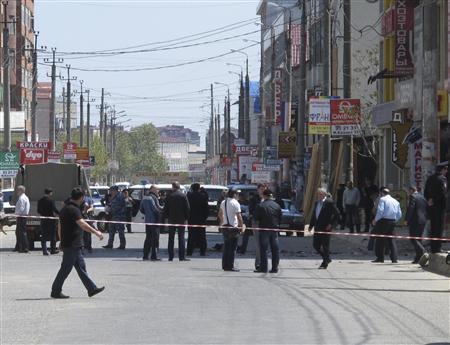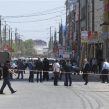
Dagestan’s Bloodshed Continues To Grow
Publication: Eurasia Daily Monitor Volume: 10 Issue: 89
By:

May 2013 in Dagestan began in the usual bloody manner. On April 30, the eve of the May 1 holiday in Russia, three police officers – a major, captain and lieutenant – were killed when an unidentified group attacked the Buinaksk district police station in the city of Buinaksk (https://kavkasia.net/Russia/2013/1367444462.php). Dagestan’s Islamist insurgents were apparently behind the attack.
On May 1, two teenagers, aged 14 and 15, were killed in an explosion when they tried to open a package lying near the door of a shop. Two male passersby, aged 40 and 47, were injured. According to investigators, the perpetrators of the blast were trying to pressure the shop’s owner. They said unidentified people had previously tried to extort money from the business owner. Three months earlier, an Improvised Electronic Device (IED) had been placed by the shop’s entrance, but was defused (https://kavkasia.net/Russia/2013/1367473288.php).
On May 2, an explosion took place next to the front gate of the home of Malik Oruskhanov, the former head of administration of the town of Semender in Makhachkala’s suburbs. Makhachkala Mayor Said Amirov had earlier fired Oruskhanov for allowing illegal construction in the suburb (www.echo.msk.ru/news/1066104-echo.html). However, it is no secret, that Oruskhanov was sacked following a police special operation in the town in March. At that time, the authorities thought that the leader of the Gimry jamaat, Ibragim Gajidadaev, was also among the five militants killed in the operation. The killing of Gajidadaev in the incident, however, has never been confirmed: indeed, DNA tests were inconclusive because Gajidadaev’s brother was also killed in the operation. According to rebel news sources, Ibragim Gajidadaev actually managed to escape the scene of the operation. If confirmed, this would mean the much hailed security service operation was in fact a failure (https://kavpolit.com/ibragim-gadzhidadaev-otstrelivaetsya-v-gimrax/). The authorities accused Gajidadaev of multiple attacks on police forces, as well as being the mastermind of the assassination of Dagestani Interior Minister Adilgirei Magomedtagirov in 2009 (https://kavigator.ru/articles/23956).
Also on May 2, police defused an Improvised Explosive Device (IED) that had been placed underneath a police officer’s car in Buinaksk. The police officer himself had spotted the IED. The IED was destroyed in a controlled explosion, but no one was injured (www.rg.ru/2013/05/02/reg-skfo/zaminirovano-anons.html).
On May 3, Britain’s Foreign Office advised its subjects to refrain from traveling to Chechnya, Dagestan, Ingushetia and several other Russian territories in the North Caucasus because of a heightened terrorist threat. The Foreign Office also discouraged travel to Budyonnovsk, Levokumsk, Neftekumsk, Stepnoi and Kurski districts of Stavropol region. Travel to North Ossetia, Karachaevo-Cherkessia and Kabardino-Balkaria was recommended only for urgent visits (www.bbc.co.uk/russian/rolling_news/2013/05/130503_rn_fco_advice_chechnya.shtml).
The concerns of the UK’s Foreign Office are quite understandable. After the bombings in Boston, dozens of British journalists flew to Dagestan to find out what made Tamerlan Tsarnaev carry out his senseless attack. They noticed that the situation in Makhachakala is far from normal, with explosions regularly heard at dusk. Locals no longer pay much attention to reports of clashes between militants and government forces, because they happen so often. Islamic culture is certainly dominant in Dagestan compared to other parts of Russia. The Foreign Office’s statement evoked an indignant response from North Caucasian governors, who have been trying hard to convince the outside world how calm their region really is. Ramzan Kadyrov, the Kremlin-backed leader of Chechnya, invited all English people to visit him, claiming that Chechnya is far safer than London (www.24news.ru/news/politics/860064n.html). Ingushetia’s leader also invited tourists to assess how safe his republic is (https://u-f.ru/News/u272/2013/05/05/654492). The governors of Stavropol region, Karachaevo-Cherkessia and Dagestan also expressed their displeasure with the Foreign Office warning as well and one wonders whether other foreign governments, including the United States will respond to the notice from Whitehall.
The fact that the situation in Dagestan remains permanently tense is no secret to anyone. Indeed, that is why police forces from all over Russia are dispatched to Dagestan, as well as to Chechnya, for six month periods to restore order in these unstable territories (https://news.mail.ru/inregions/ural/74/society/12984189/).
Trying to improve Dagestan’s image, the republic’s official news agency, RIA Dagestan, has several items on its website about the achievements of the republic, the victories of its athletes and multiple meetings between government officials and the general population. There is not even a hint about the upcoming presidential elections in the republic, which are set to take place in four months. The Kremlin’s candidate, Ramazan Abdulatipov, need not worry about competitors, given that the president of the republic will be elected by the republican parliament. The members of the Dagestani parliament are fully aware of to whom they owe their seats, so there will not be any surprises at the ballot boxes.
In any case, elections for president will change little in the general situation in the republic. The armed confrontation between the jihadists and the government is intensifying, despite frequent losses among the members of the local jamaat’s involved in the regional insurgency. The jihadists are at a stage in which their ideological base in the republic continues to expand, so the culmination of this struggle probably lies ahead.




